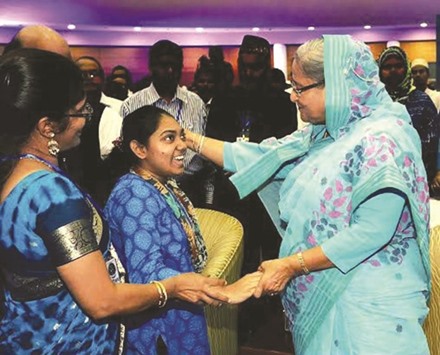Bangladesh Prime Minister Sheikh Hasina yesterday said her government would make ‘permanent arrangements’ like formation of a trust fund for the country’s disabled children, so that they do not remain neglected.
“It’s a responsibility of the state to take care of the children with disabilities in absence of their parents ... we are going to take such an initiative so that they can grow up in a beautiful environment.” she said.
“A mother struggles and suffers mostly throughout her life for her disabled kids. The mother mainly looks after (such) children ... but what will happen and where these children would go when their parents are not there to take care of them. Keeping this in mind, we are making permanent arrangements for the children with disabilities so that they never remain neglected,” she said while addressing the inaugural function of World Autism Awareness Day at Bangabandhu International Conference Centre in Dhaka.
“It happens in Bangladesh that if any government takes any move, it is closed or destroyed with the change of government,” she said referring to the shutdown of community clinics by the BNP-Jamaat government during its 1996-2001 tenure.
The prime minister called upon the private sector to come forward to supplement the government efforts for the welfare of the people with disabilities.
“I would like to tell the private sector as well as the well-off people for the welfare of those who are born with disabilities or autism so that they won’t remain neglected ... they a part of the society,” she said.
Hasina asked the authorities concerned to develop software, hardware and websites suiting for the persons with
disabilities.
“I have seen that like other people, the persons with disabilities have been working with equal efficiency in computer by using specific software. They could contribute to the ICT sector if they are offered proper training,” she said.
The prime minister also put emphasis on providing special care to the children with autism disorder by keeping their
special demands in mind.
“The tender-hearted children with autism (disorder) could be turned into a “valuable asset” if they are given special care by keeping their special demands in mind,” she said.
Hasina said the persons with disabilities have brought success for the country in various fields. “The disabled players have brightened the country’s image by winning golds in Para Olympic and Special Olympics,” she said.
“So I am calling upon all to integrate them in the mainstream of development ... we would transform Bangladesh into a middle-income country by 2021 and a developed country by 2041 with united efforts of all,” she said.
The prime minister lauded contribution of her daughter and eminent child psychologist Saima Wazed Hossain and said it is Saima who created global awareness about autism and other physical and mental
disability.
Referring to a resolution adopted in the United Nation General Assembly unanimously, she said, Saima has a very strong and active role in this regard.
Hasina said, two laws - the Persons with Disability Rights and Protection Act, 2013 and the Neuro-developmental Disability Protection Act, 2013 - were passed in parliament to protect interests of the persons with disability.
“Besides, 31bn taka has already been allocated for the trustee board of Neurodevelopmental Disability Protection formed to protect interests and rights of the autistic people and persons with disabilities,”
she said.
Hasina said various services are being provided free of cost to autistic children and persons with disabilities from the Autism Resource Centre and a school set up on the campus of the National Disability Development Foundation located at Mirpur in the capital.
Referring to the realistic education policy of her government, the prime minister said it ensured the rights to education of the autistic children incorporating a clause “No children could be kept away from the educational activities due to
disabilities.”
Hasina said the government has started work under the Ministry of Education to set up an academy for autism and neurodevelopmental disorders aimed at bringing the autistic children to the mainstream.
Such initiative would create opportunities of expanding inclusive educational activities for the disabled including autistic children, she hoped.
Hasina said about 2.4mn people with disability receive services from the autism corners of the One Stop Service Centres in in 64 districts.

Prime Minister Sheikh Hasina talking to a girl after she addressed a function to mark World Autism Awareness Day yesterday in Dhaka.
